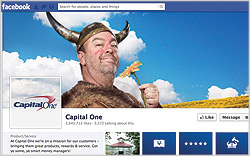Marketers Mixed On Facebook Changes
- by Mark Walsh @markfwal, August 24, 2012

Concerns about whether Facebook's ad revenue growth will meet lofty expectations helped cut the company's market valuation nearly in half since its May IPO.
While much of that concern has focused on Facebook's ability to make money from mobile ads, a new eMarketer report looks at how marketers are responding to other design and ad-related changes that Facebook introduced in the lead-up to its IPO.
That includes steps like the rollout of the Timeline for brand pages, including Sponsored Stories in the news feed and introducing new measurement tools.
The bottom line: the changes suggest that companies are likely to have to spend more on paid media on Facebook to get meaningful campaign results. Given the intense pressure the social network is now under as a public company, it's clear why Facebook is encouraging greater use of paid ads now, in combination with earned and owned media.
It's doing that in ways that are both obvious -- such as adding new formats -- and more subtle: phasing out marketers' ability to set default tabs on their pages with the launch of the Timeline feature. Now, the default landing page must be the brand Timeline.
“You can still [use tabs], but it’s not necessarily going to pop the
way it would have under the old format,” Gayle Weiswasser, VP of social media at Discovery Communications, told eMarketer. “It means that people have to be a bit more creative about how
they are getting traffic to those pieces of content or apps.” Or potentially rely more on paid advertising to achieve broader reach for campaigns.
With the integration of Sponsored
Stories into the news feed, and the rollout of new formats like Reach Generator, Facebook underscored that owned media doesn't have much visibility. The company said at its fMC conference that when a
brand posts an update on Facebook, only 16% of its fans actually see the content.
By paying for placement in the news feed, marketers' updates can get higher priority in Facebook's Edgerank
algorithm, which determines what messages and comments are shown to a user.
The increased role of paid advertising on Facebook requires closer coordination between the advertising and
social media teams and a more considered strategy around posts. Adrian Parker, group manager of social, mobile and emerging media at Intuit, explained that paid media is geared toward special events
rather than day-to-day outreach and engagement.
The report also highlighted Facebook's shift toward more incisive analytics to reduce the emphasis on “likes” as the main way to
gauge campaign performance on the site. These include measures iike “People Talking About This,” which counts users who “liked,” commented on, shared posts or took other social
actions in connection with a brand page. Another new metric is “Total Reach,” which determines how many users see brand content.
Based on various third-party studies, eMarketer
concludes that the response to Timeline by consumers and marketers alike has been mixed. It's not clear whether the redesign has boosted engagement. Jeff Rubenstein, senior social media manager for
Sony's PlayStation brand, for instance, said that of its almost 24 million fans, only a fraction ever visit its Facebook page.
How much Sony and other advertisers buy into Facebook's mantra
of pairing paid and earned media on the site will play a large part in the company's ad growth. General Motors wasn't sold on the paid part of the equation and pulled back its Facebook advertising
this spring.
“Facebook’s advertising products can help overcome some of the difficulties with marketing on the site, but that isn’t necessarily what marketers, that are
often satisfied with the free tools, want to hear,” stated the eMarketer report.



The change over is a mess ... for users of Facebook. What Facebook does not understand is how advertising actually works in the consumer purchase process. When it becomes difficult for users to use, as it has become, people spend less time with the vehicle. When the format becomes overwhelmingly cluttered (9 ads on a page ... really?) advertising effectiveness declines significantly. Facebook is this generations Microsoft, a totally inner directed company that will kill the golden goose eventually, because it either does not understand or does not care about usability for its readers.
I agree with you Howard. As in every other media space, if there are no readers/listeners/viewers, there will be no advertisers. Facebook is degrading its relevance to both brands and consumers. It appears the herd is migrating toward Pinterest. If Facebook doesn't focus on the experience, we will see the trend move to posting notes on an electronic refrigerator.
Now that the powers that be (Zuckerberg plus his friends and all the early investors) have hit pay-dirt with the selling of their stock when it debuted at double the value it is now, I highly doubt it matters to them if FB is able to transform itself to compete or rather get to be on the same level as Google.
The Timeline roll out for brand pages makes a lot of sense but to the chagrin of the main street users, this change is akin to all the previous changes/development we've seen in the past (beacon, anyone?).
Each passing milestone reveals nothing extra ordinary with FB and it's only a matter of time before Google+ and Pinterest lures disgruntled users completely away from FB.